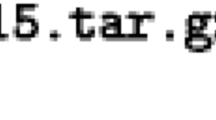Abstract
A new model, called acceleration model, is proposed in the framework of the heterogenous case of the graded response model, based on processing functions defined for a finite or enumerable number of steps. The model is expected to be useful in cognitive assessment, as well as in more traditional areas of application of latent trait models. Criteria for evaluating models are proposed, and soundness and robustness of the acceleration model are discussed. Graded response models based on individual choice behavior are also discussed, and criticisms on model selection in terms of fitnesses of models to the data are also given.
Similar content being viewed by others
References
Birnbaum, A. (1968). Some latent trait models and their use in inferring an examinee's ability. In F. M. Lord & M. R. Novick (Eds.),Statistical theories of mental test scores (chapters 17–20). Reading, MA: Addison Wesley.
Bock, R. D. (1972). Estimating item parameters and latent ability when responses are scored in two or more nominal categories.Psychometrika, 37, 29–51.
DiBello, L. V., Stout, W. F., & Roussos, L. A. (1993).Unified cognitive/psychometric diagnosis foundations and application. Paper presented at the 1993 American Education Research Association Meeting, Atlanta, GA.
Levine, M. (1984).An introduction to multilinear formula scoring theory (Office of Naval Research Report, 84-4). Washington, DC: Department of the Navy.
Lord, F. M., & Novick, M. R. (1968).Statistical theories of mental test scores. Reading, MA: Addison Wesley.
Luce, R. D. (1959).Individual choice behavior. New York: Wiley.
Masters, G. N. (1982). A Rasch model for partial credit scoring.Psychometrika, 47, 149–174.
Muraki, E. (1992). A generalized partial credit model: Application of an EM algorithm.Applied Psychological Measurement, 16, 159–176.
Ramsay, J. O., & Wang, X. (1993).Hybrid IRT models. Paper presented at the 1993 Psychometric Society meeting, Berkeley, California.
Samejima, F. (1969). Estimation of ability using a response pattern of graded scores,Psychometrika Monograph No. 17, 34(4, Pt. 2).
Samejima, F. (1972). A general model for free-response data.Psychometrika Monograph No. 18, 37(4, Pt. 2).
Samejima, F. (1973a). Homogeneous case of the continuous response model.Psychometrika, 38, 203–219.
Samejima, F. (1973b). A comment on Birnbaum's three-parameter logistic model in the latent trait theory.Psychometrika, 38, 221–233.
Samejima, F. (1974). Normal ogive model on the continuous response level in the multidimensional latent space.Psychometrika, 39, 111–121.
Samejima, F. (1983). Some methods and approaches of estimating the operating characteristics of discrete item responses. In H. Wainer & S. Messick (Eds.),Principals of Modern Psychological Measurement: A Festschrift for Frederic M. Lord (pp. 159–182). Hillsdale, NJ: Lawrence Erlbaum.
Samejima, F. (1993). Human psychological behavior: Approached by latent trait models.Proceedings of the IEEE International Workshop on Neuro-Fuzzy Control, Muroran, Japan, 26–33.
Samejima, F. (1994). Roles of Fisher type information in latent trait models. In H. Bozdogan (Ed.),Proceedings of the First US/Japan Conference on the Frontiers of Statistical Modeling: An Informational Approach. Netherlands: Kluwer Academic Publishers. (The Convention was held in May 1992 in Knoxville, TN)
Samejima, F. (1995). A cognitive diagnosis method using latent trait models: competency space approach and its relationship with DiBello and Stout's unified cognitive/psychometric diagnosis model. In P. D. Nichols, S. E. Chipman & R. L. Brennan (Eds.),Cognitively diagnostic assessment (pp. 391–410). Hillsdale, NJ: Lawrence Erlbaum.
Samejima, F. (in press). Rationale and actual procedures of efficient nonparametric approaches for estimating the operating characteristics of discrete item responses,Psychometrika.
Author information
Authors and Affiliations
Corresponding author
Additional information
This research was supported by the Office of Naval Research (N00014-90-J-1456).
Rights and permissions
About this article
Cite this article
Samejima, F. Acceleration model in the heterogeneous case of the general graded response model. Psychometrika 60, 549–572 (1995). https://doi.org/10.1007/BF02294328
Received:
Revised:
Issue Date:
DOI: https://doi.org/10.1007/BF02294328




